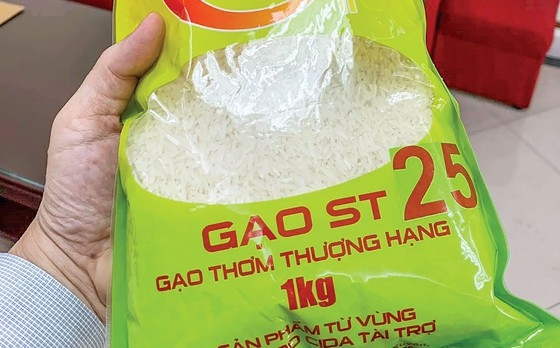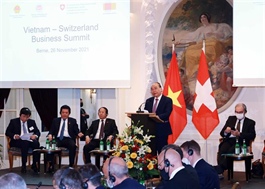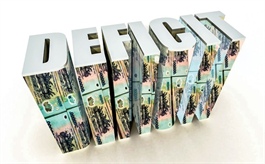EU-Vietnam Free Trade Agreement an important opportunity
EU-Vietnam Free Trade Agreement an important opportunity
The EU-Vietnam Free Trade Agreement (EVFTA) is a new generation of FTA that will greatly influence Vietnam, because the EU is one of Vietnam's leading trade partners.
Illustrative photo. |
EVFTA will provide the essential trade link and has already made an important impression in Vietnam. Europe and Vietnam have a past history of trade where a 100 years ago European merchant ships once traded at Vietnamese ports of Van Don, Pho Hien, Hoi An, and Ben Nghe.
Huge incentive
In 2020, the Covid-19 pandemic swept the world like a hurricane storm, and trade flow across the EU was totally disrupted. This also affected trade with Vietnam. In order to get back to normal, EVFTA has made significant contributions since August 2020, to help Vietnam maintain a trade surplus with the EU of upto USD 22.5 bn. At the same time, the import from the EU has opened up opportunities for Vietnam to access technology and transfer original patents, accelerating the process of industrialization and modernization within the country.
In 2021, with the pandemic still raging under a new Delta variant, the EU launched unprecedented economic relief packages of about Euro 2,364 bn, so the EU economy recovered quite quickly. In the first three quarters of the year, EU imported goods from outside the bloc increased by 16.3%, over the same period in 2020, of which imports from Vietnam increased by USD 28.8 bn, up 11.5% over the same period last year. Under the ongoing difficult conditions, Vietnamese enterprises not only boosted exports to old allies in Western Europe such as Germany, the Netherlands, France, Italy, and Denmark, but also opened to new and promising markets such as the Nordic countries, and Southern Europe.
One of the driving forces for Vietnam's exports to the EU was the EVFTA that has given preferential treatment to our goods and services, especially key products and services. Before the EVFTA, the EU gave us a Generalized System of Preferences (GSP), but because GSP is a unilateral mechanism, when our economy develops, it will be withdrawn. As for EVFTA, this is a bilateral commitment and offers incentives with long-term value, which both sides can implement.
Currently, the rate of incentives from EVFTA through issuance of a Certificate of Origin (C/O) of goods is approximately 20%, which is a very significant rate. For export shipments to the EU with a value of less than Euro 6,000, enterprises are allowed to self-certify their origin, automatically receiving preferential treatment. Through trade relations with the EU, the competitiveness of Vietnamese goods has improved a notch, making Vietnam the leading trading partner of the EU in Southeast Asia and in the top ten countries supplying goods to the EU. The EU is also the third-largest market for Vietnamese agricultural products.
Wasted opportunity
The fact that Vietnam's 30,000 tons of fragrant rice, including nine fragrant rice varieties, namely, Jasmine 85, ST 20, ST 5, Nang Hoa 9, VD 20, RVT, OM 4900, OM 5451, and Cho Dao enjoy 0% tax under the EVFTA commitment is an opportunity to increase their export. Unfortunately, due to problems with certification to ensure the right fragrant rice varieties, many businesses did not take advantage of this opportunity.
SPS Vietnam Office (*) received a warning from the EU concerning frozen frogs legs because they contained a banned substance called nitrofurans-furazolidone with a residue level of 17 µg/kg-ppb, prompting France to recall the product from the market, while Switzerland totally destroyed the entire product. At the same time, the EU also issued a warning on grapefruits for banned substances Propargite 0.23 ppm and Fenobucarb 0.032 ppm exceeding permissible limits. Grapefruit has now been recalled from the market in Norway.
At the beginning of October, one batch of fragrant rice ST25 was tested in Belgium and found to have residues of Tricyclazole in excess of permissible limits. Also in October, rambutan, dried wood ear, black pepper, cinnamon powder, and a few seafood products of Vietnam were issued warnings for residues of harmful substances by the EU.
After continuous warnings on many shipments of agricultural and aquatic products from Vietnam for food safety, on 3 November the European Commission (EC) announced an amendment to regulations on temporary application of official and emergency control measures on certain foods entering the EU market. Accordingly, on 15 November the frequency of pesticide tests on specific Vietnamese herbs and fruits began on items such as coriander, basil, okra, pepper, and dragon fruit. Every six months, the European Commission will review the list of food items and feed of non-animal origin from certain third world countries. These measures will ensure food safety, and allow officials to even punish offenders.
Despite all our efforts to improve on fishing regulations, we still do not know if the yellow card on fishing will be removed in 2022 or not. The EU agreement with Thailand, Malaysia, the Philippines, and Indonesia will soon be realized, then Vietnam's position will be shaken, and our market share in the EU market will be reduced a great deal. However, we can only hope that the future will bring in more incentives and less difficulties.



















